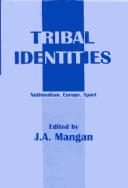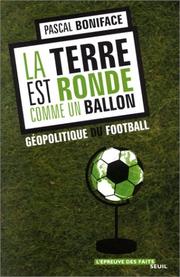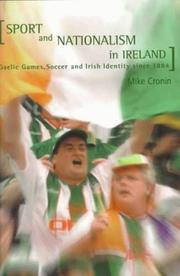| Listing 1 - 10 of 110 | << page >> |
Sort by
|
Book
ISBN: 9780367356569 9780367356552 9780367566807 Year: 2021 Publisher: London New York Routledge
Abstract | Keywords | Export | Availability | Bookmark
 Loading...
Loading...Choose an application
- Reference Manager
- EndNote
- RefWorks (Direct export to RefWorks)
"Sport and Secessionism examines how sporting cultures both reflect and inform secessionist movements around the world. Investigating both historical and contemporary cases, the book explores key themes including nationalism, nation building, state-region antagonisms, independence movements, identity and ethnic politics, sovereignty and autonomy processes, all through the lens of sport. Sports are uniquely positioned to shed light on secessionist politics due to their pervasiveness in society, and their ability to absorb, reflect, and produce political projections. The book presents analyses of a wide range of geographical, cultural and political contexts in which sports are deployed to pursue regional independence, or greater sovereignty and autonomy, and explores the dual processes of sub-national identity construction and state sovereignty deconstruction. It includes cases from regions as diverse as Ireland, Hong Kong, Taiwan, Turkey, Catalonia, Biafra and the UK. Offering a unique perspective on an important geopolitical issue, this book is fascinating reading for anybody with an interest in sport and politics, the sociology of sport, political science or political geography, or international history"

ISBN: 0714646660 Year: 1996 Publisher: London Cass
Abstract | Keywords | Export | Availability | Bookmark
 Loading...
Loading...Choose an application
- Reference Manager
- EndNote
- RefWorks (Direct export to RefWorks)
Book
Year: 2004 Publisher: Oxford ; New York Berg
Abstract | Keywords | Export | Availability | Bookmark
 Loading...
Loading...Choose an application
- Reference Manager
- EndNote
- RefWorks (Direct export to RefWorks)
Book
ISBN: 2368020187 9782368020180 Year: 2022 Publisher: Paris: BiblioMonde,
Abstract | Keywords | Export | Availability | Bookmark
 Loading...
Loading...Choose an application
- Reference Manager
- EndNote
- RefWorks (Direct export to RefWorks)
Soccer --- Soccer --- Nationalism and sports

ISBN: 9782020543019 202054301X Year: 2002 Publisher: Paris: Éditions du Seuil,
Abstract | Keywords | Export | Availability | Bookmark
 Loading...
Loading...Choose an application
- Reference Manager
- EndNote
- RefWorks (Direct export to RefWorks)
Soccer --- Soccer --- Nationalism and sports
Book
ISBN: 9782200248338 2200248334 Year: 2010 Publisher: Paris: Armand Colin,
Abstract | Keywords | Export | Availability | Bookmark
 Loading...
Loading...Choose an application
- Reference Manager
- EndNote
- RefWorks (Direct export to RefWorks)

ISBN: 1851824561 Year: 1999 Publisher: Dublin Four courts press
Abstract | Keywords | Export | Availability | Bookmark
 Loading...
Loading...Choose an application
- Reference Manager
- EndNote
- RefWorks (Direct export to RefWorks)
Book
ISBN: 9781349503940 1349503940 1137487186 1137518006 Year: 2015 Publisher: New York, NY Palgrave Macmillan
Abstract | Keywords | Export | Availability | Bookmark
 Loading...
Loading...Choose an application
- Reference Manager
- EndNote
- RefWorks (Direct export to RefWorks)
Sports --- Nationalism and sports --- History --- Social aspects
Book
ISBN: 2100822365 9782100822362 Year: 2014 Publisher: Malakoff: Dunod,
Abstract | Keywords | Export | Availability | Bookmark
 Loading...
Loading...Choose an application
- Reference Manager
- EndNote
- RefWorks (Direct export to RefWorks)
Sports --- Sports and globalization --- Nationalism and sports
Book
ISBN: 0292734778 Year: 2011 Publisher: Austin : University of Texas Press,
Abstract | Keywords | Export | Availability | Bookmark
 Loading...
Loading...Choose an application
- Reference Manager
- EndNote
- RefWorks (Direct export to RefWorks)
Fútbol, or soccer as it is called in the United States, is the most popular sport in the world. Millions of people schedule their lives and build identities around it. The World Cup tournament, played every four years, draws an audience of more than a billion people and provides a global platform for displays of athletic prowess, nationalist rhetoric, and commercial advertising. Fútbol is ubiquitous in Latin America, yet few academic histories of the sport exist, and even fewer focus on its relevance to politics in the region. To fill that gap, this book uses amateur fútbol clubs in Chile to understand the history of civic associations, popular culture, and politics. In Citizens and Sportsmen, Brenda Elsey argues that fútbol clubs integrated working-class men into urban politics, connected them to parties, and served as venues of political critique. In this way, they contributed to the democratization of the public sphere. Elsey shows how club members debated ideas about class, ethnic, and gender identities, and also how their belief in the uniquely democratic nature of Chile energized state institutions even as it led members to criticize those very institutions. Furthermore, she reveals how fútbol clubs created rituals, narratives, and symbols that legitimated workers' claims to political subjectivity. Her case study demonstrates that the relationship between formal and informal politics is essential to fostering civic engagement and supporting democratic practices.
| Listing 1 - 10 of 110 | << page >> |
Sort by
|

 Search
Search Feedback
Feedback About UniCat
About UniCat  Help
Help News
News